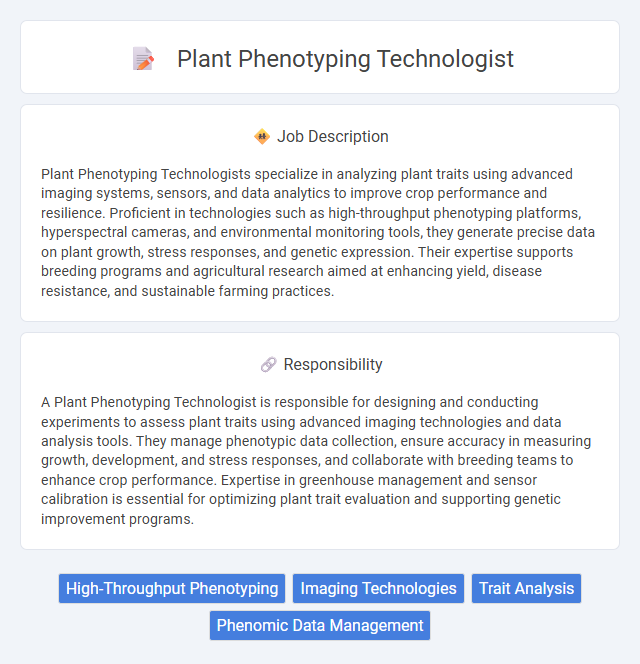
Plant Phenotyping Technologists specialize in analyzing plant traits using advanced imaging systems, sensors, and data analytics to improve crop performance and resilience. Proficient in technologies such as high-throughput phenotyping platforms, hyperspectral cameras, and environmental monitoring tools, they generate precise data on plant growth, stress responses, and genetic expression. Their expertise supports breeding programs and agricultural research aimed at enhancing yield, disease resistance, and sustainable farming practices.
Individuals with a strong interest in plant biology and experience in data analysis may find the role of a Plant Phenotyping Technologist well-suited to their skills. Those who are comfortable working with advanced imaging technologies and possess attention to detail could likely adapt to the precision required in this job. Candidates who enjoy combining technology and research in agricultural contexts may have a higher probability of thriving in this position.
Qualification
Expertise in plant biology, genetics, and agronomy is essential for a Plant Phenotyping Technologist. Proficiency in advanced imaging technologies, data analysis software, and automation tools is highly valued. A strong educational background with at least a bachelor's degree in plant sciences, biotechnology, or related fields, often complemented by experience in experimental design and statistical analysis, enhances job qualification.
Responsibility
A Plant Phenotyping Technologist is responsible for designing and conducting experiments to assess plant traits using advanced imaging technologies and data analysis tools. They manage phenotypic data collection, ensure accuracy in measuring growth, development, and stress responses, and collaborate with breeding teams to enhance crop performance. Expertise in greenhouse management and sensor calibration is essential for optimizing plant trait evaluation and supporting genetic improvement programs.
Benefit
Working as a Plant Phenotyping Technologist likely offers the benefit of contributing to innovative agricultural research, improving crop yields and sustainability. The role may provide access to cutting-edge technology and collaborative environments, enhancing professional growth. Opportunities for career advancement and involvement in impactful projects could also be strong incentives.
Challenge
The role of a Plant Phenotyping Technologist likely involves overcoming significant challenges in accurately measuring and analyzing complex plant traits in varied environmental conditions. It is probable that the job demands adapting to rapidly evolving technologies and integrating multidisciplinary data to improve crop performance predictions. Navigating these obstacles may require strong problem-solving skills and continuous learning to optimize phenotyping platforms effectively.
Career Advancement
Plant Phenotyping Technologist roles offer significant career advancement opportunities through expertise in high-throughput imaging, data analysis, and crop trait measurement. Mastery of advanced phenotyping platforms and bioinformatics tools enables professionals to transition into research scientist or project management positions within agritech firms or research institutions. Continuous skill development in machine learning and automation enhances employability and leadership potential in precision agriculture and plant breeding sectors.
Key Terms
High-Throughput Phenotyping
High-Throughput Phenotyping in plant phenotyping technology enhances the assessment of plant traits using automated imaging systems and data analytics, enabling rapid measurement of growth, yield, and stress responses. A Plant Phenotyping Technologist operates advanced phenotyping platforms, integrates sensor data, and applies machine learning algorithms to analyze phenotypic variation across large plant populations. Expertise in imaging techniques, data processing pipelines, and crop genetics supports precision breeding and sustainable agriculture development.
Imaging Technologies
Plant Phenotyping Technologists specializing in imaging technologies leverage advanced tools such as multispectral, hyperspectral, and thermal cameras to capture detailed physiological and morphological data of plants. These experts utilize high-throughput imaging platforms and image analysis software to quantify traits related to growth, stress responses, and disease resistance, enabling precise assessment of plant performance under diverse environmental conditions. Mastery in remote sensing, data integration, and machine learning algorithms is essential for transforming raw imaging data into actionable insights for crop improvement and sustainable agriculture.
Trait Analysis
Plant Phenotyping Technologists specialize in trait analysis by utilizing advanced imaging technologies and data analytics to evaluate plant characteristics such as growth rate, stress response, and yield potential. Their expertise in high-throughput phenotyping platforms enables precise measurement of morphological, physiological, and biochemical traits critical for crop improvement. This role supports breeding programs by providing accurate, scalable data to accelerate the development of resilient and high-yielding plant varieties.
Phenomic Data Management
Plant Phenotyping Technologists specializing in phenomic data management leverage advanced imaging technologies and data analytics to capture, process, and analyze high-throughput phenotypic traits in crops. Their expertise enables the integration of large-scale phenomic datasets with genomic information to accelerate breeding programs and enhance crop performance under diverse environmental conditions. Proficiency in data management software, metadata standards, and automated data extraction pipelines is critical for ensuring accuracy, scalability, and reproducibility in phenomic research.
 kuljobs.com
kuljobs.com